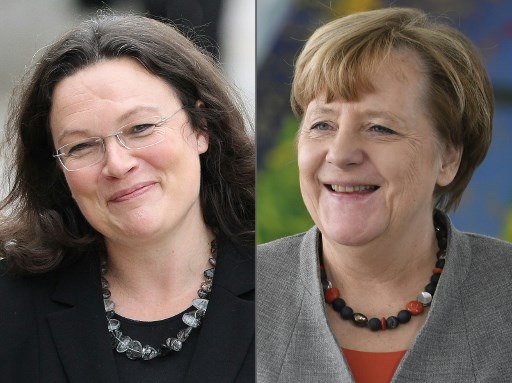
BERLIN, Germany (AFP) – Germany’s chaos-wracked Social Democrats have named Andrea Nahles as their designated next leader, meaning women will soon be in the driver’s seats of the two biggest parties and shifting a long-skewed gender balance in politics.
Alongside Chancellor Angela Merkel, Nahles is set to join a growing band of women heading, or co-leading, German political parties despite the fact that female lawmakers still account for fewer than one third of seats in parliament.
Merkel has also pledged for the first time, following the lead of France and Canada, to place women in half of the cabinet posts in her fourth-term government, which is expected to be launched in late March.
When Martin Schulz, the luckless former head of the Social Democrats (SPD), said last week he wanted to hand over the post to Nahles, he declared that it was time, at last, “for a woman to lead the 153-year-old party.”
The election loser also said he wanted to become foreign minister, sparking an SPD outcry about his perceived opportunism that forced him to back off and has now ended his short career near the top of German politics.
With the SPD in open turmoil, said the Sueddeutsche Zeitung, a major party has once again asked a “rubble woman” to clean up the mess — a reference to the mythologized women who after World War II helped clear Germany’s bombed cities.
The move evoked the start of Merkel’s rise within the Christian Democrats, it said, when the east German outsider took the helm of the male-dominated conservatives as they were reeling from a campaign finance scandal around former chancellor Helmut Kohl.
“When everything is in ruins,” the newspaper said, “women are asked to step in.”
‘Only real guy’
Nahles, 47, a former labor minister who once headed the SPD youth wing, has earned a reputation as hard-working, pragmatic and combative.
She invigorated her demoralized party with a lectern-thumping speech in January, when the tabloid-style Bild daily paid her the questionable compliment of being “the only real guy” in her party.
Nahles herself made headlines with unconventional language when she used a street brawler’s phrase akin to “knocking someone’s teeth in” after the election loss for what she then saw as the party’s future role in opposition.
She recently told news weekly Der Spiegel that female politicians tend to be criticized for ambition “while the boys are judged differently.”
Nahles was Tuesday unanimously approved by the party leadership, but will have to wait to take the top job until an April 22 party congress, with Hamburg mayor Olaf Scholz in charge until then.
Besides Merkel and Nahles, other women increasingly dominate the political scene, from Sahra Wagenknecht of the far-left Die Linke to Alice Weidel of the far-right Alternative for Germany (AfD).
Merkel’s mooted one-time successors are women, with regional leader Annegret Kramp-Karrenbauer having recently bumped Defence Minister Ursula von der Leyen as the rumoured favourite.
The rise of women in politics comes despite the fact Germany is still a long way from granting gender equality in corporate boardrooms and other sectors of society.
In the new parliament, women hold just 30.7 percent of seats, the lowest ratio in years.
‘Neurotic relationship’
When it comes to gender equality, the Greens and Die Linke have long been pioneers, with 50-50 splits for their party lists, while the worst performer is the AfD, with 10 percent female lawmakers, according to a count by Die Welt daily.
Merkel’s conservatives — including her Bavarian allies the CSU, who like to give speeches in beer halls — have a 20 percent female share, less than half of the SPD’s 42 percent.
And the pro-business Free Democrats — whose former lawmaker Rainer Bruederle sparked an early German version of the #MeToo debate in 2013 with alleged inappropriate comments to a female journalist — has women in 22 percent of seats.
Merkel has avoided calling herself a feminist and long rejected quotas to promote women in politics or business.
In an awkward panel discussion a year ago with Ivanka Trump, Merkel gave an evasive answer when asked whether she was a feminist.
Only after Queen Maxima of the Netherlands defined being a feminist as wishing “freedom of choice and opportunities” to all women, Merkel chimed in that “then I am one, too”.
Merkel’s public persona, rather than that of women’s champion, has been that of “Mutti” or “Mummy,” arguably a step up from the days when Kohl dubbed her his “little girl.”
Der Spiegel argued recently that many German men “have a neurotic relationship with Merkel” and that even her nickname “contains a strange mixture of derision and subservience.” (Agence France-Presse)







